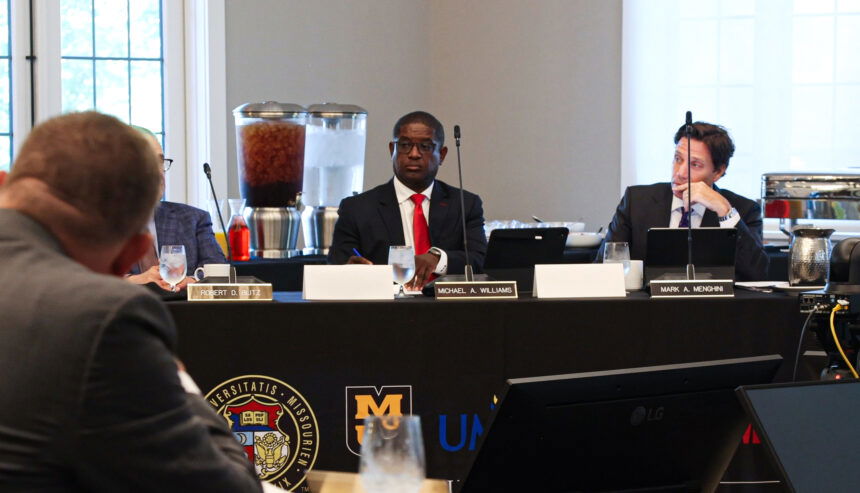UM Board of Curators amends transfer policy, approves FY26 budget


ST. JOSEPH, Mo. (News-Press NOW) -- The St. Joseph Country Club played host Thursday to some of the state's top leaders and policymakers in higher education, with future funding and key projects taking center stage.
The University of Missouri System Board of Curators addressed a wide variety of subjects affecting the state of Missouri and the country as a whole. The board unanimously approved a $5.3 billion budget for 2026, an 8% increase from the $4.9 billion budgeted for FY 2025.
The system consists of four campuses: Columbia (MU), St. Louis (UMSL), Rolla (Missouri S&T) and Kansas City (UMKC), along with an extension program and ten research and technology parks.
With $539 million in appropriations from the state of Missouri for 2026, the budget represents a 3% jump in state core funding for all four universities, including an additional $10 million for rural medical education.
"This is the sixth straight year of increasing our state appropriation," University of Missouri President Mun Y. Choi said. "Missouri has made a commitment, beginning about six years ago, to improve the funding for the University of Missouri and other public universities because of the importance of our role as an economic engine."
This budget increase comes despite a reduction of roughly $7 to $8 million in federal grant revenue for the system and amid critical questions about long-term support from the federal government in anticipation of spending cuts and reduced funding for higher education.
Choi pointed to schools like the University of Utah, Minnesota and Maryland as all having seen state appropriations cut by 7% to 10% this year.
"There are many states that are not doing well in terms of their support for public higher education," Choi said. "We don't like to cut programs because we believe everything that we do is important, but it's really time for us to prioritize."
Choi said despite not wanting cuts, this meant asking central administrators, deans and department chairs across the system to prioritize projects based on the impact on student success, research breakthroughs and state engagement, three of their core missions.
"Just that pursuit, we've had a $40 million reduction in expenses...We did that in a very short time frame," he said.
The consent agenda approved by Curators also moved a key project forward for Northwest Missouri. Board members unanimously approved a $16 million appropriation request for a new UMKC Dentistry program in St. Joseph for fiscal year 2027.
Approval of the 2026 operating budget was far from the only key move made Thursday; board members approved a project request for a $120 million Energy Innovation Center for MU, an energy production research facility that will combine engineering, physics, computer science, chemistry and biochemistry.
"The Energy Innovation Center is targeted primarily at enhancing the research capabilities of our university," Board Chairman Todd Graves said. "We'd like to create additional jobs and economic opportunity. And certainly, energy will be a challenge for the next many years in this country. So that's what we're focused on."
Choi agreed, saying advancements in energy production will have wide-ranging benefits that go far beyond the university.
"Not only are the energy innovations going to be very important at the university, but useful and practical policies that involve our energy use in this state," Choi said.
Unanimous approval of the consent agenda also cleared the way for a new transfer policy change throughout the UM System.
The change allows students from any state to transfer from an accredited community college to a university if they meet requirements, which include: 60 transferable credit hours, an Associate of Arts degree and a minimum 2.5 GPA.
Choi called it a "proactive" move, allowing the UM System to open doors to new markets and help plan for the future, one that could include fewer students enrolling in higher education.
"We decided, 'let's make it nationwide' because of the types of programs that we are offering," Choi said. "Missouri right now is a place where we have to seek students from beyond our own borders because of the peak of high school graduates you're going to see in the coming years."





